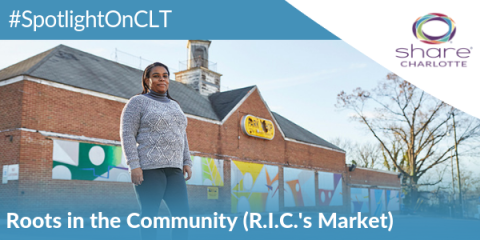#SpotlightOnCLT: Roots in the Community (R.I.C.'s Market)
Walking to the grocery store in Detroit in the 1970s, 6-year-old Angela Gray loved math and counting money.
“I remember going to the store with my mom and they had a sign that read, ‘Sale Yogurt - 4 for a $1’. I told my mom, ‘That’s not a sale because the yogurt is usually 22 cents each,’ Gray reminisced.
“‘Most people don’t pick up on that,’ my mom told me. It also bothered me that we could get more groceries in nicer areas than we could in the stores in our neighborhood. Thus, I began at a young age to notice how poorer people often had to pay more for groceries."
This is not a Detroit issue. This is a universal access and price gouging issue. In the Charlotte area, over 87,000 residents lack access to fresh, healthy affordable food.
Thus, a dream began to germinate - an intangible desire to create more equity around food access, affordability and education. Gray’s dream now Roots In the Community (RIC) Market - a nonprofit grocery store that subsidized the cost of healthy foods, enabling lower-income communities to eat higher quality and healthier food - took root at an unlikely time.
“This was ‘When I’m old about 40, rich and retired, I’m going to open up a nonprofit grocery store in Detroit’ type of dream. I would later share this dream with colleagues at Bank of America and in my MBA program entrance essay. And I was asked, ‘Why not now in Charlotte?’”
So in 2013, Gray’s Google search for existing models of nonprofit groceries only found two nonprofit groceries located in Canada. In 2014, RIC Market, a Seed20 contender, gained support and a retired CEO of Giant Grocery also gave the dream legs through confirming its potential.
The capital intensive part is where RIC needs your help. A nonprofit grocery is not a standard term, so explaining the concept and dismissing the idea that this is a co-op is one of the biggest hurdles.
“It’s a public store like Harris Teeter meeting people where they are, subsidizing the cost of healthy food for those who need it. By using a sliding scale, we can provide access to healthier food for everyone,” Gray explained to me.
After meetings with Atrium Health, the Mecklenburg County Health Department and grocery industry leaders, Gray is confident with the right support (they’re waiting on a USDA grant response) that RIC Market is gaining momentum.
Securing a location and raising the capital are their biggest hurdles, but they are looking at the old A&P building in West Charlotte among other locations. One woman at a community meeting thanked Gray for her efforts saying, “We have been trying to get a grocery store here for over 30 years.”
“We also realize it’s not just access,” Gray explained. “Where I live now, I’m surrounded by grocery stores. One (a store) doesn’t mean people can afford it. There’s an educational element. We, as a nation, don’t do a good job teaching nutrition. We need to educate people on the buying process, preparation, nutrition and food storage.”
Gray sometimes still gets the question, ‘What about food stamps? Aren’t those available for those with limited discretionary funds?’
As Angela explained to me, “Most families on food stamps don’t receive enough benefits to cover an entire month and there are certain things that you are limited with to purchase using food stamps; food that is healthier tends to cost more. At RIC Market they want to subsidize the cost of healthy food, enabling lower-income people to eat higher quality and healthier food, lowering health risks and higher healthcare costs. It never made sense to me why people should have to struggle for food. It’s also something that affects everyone - it doesn’t matter how much money you have...it affects you - Food is preventive healthcare...it might not immediately affect you, but at some point this is going to affect all of us through healthcare cost, our labor force and brain development of future leaders.
If you’re interested in investing in Roots in the Community (RIC) Market Foundation , you can learn more about this SHARE Charlotte partner we are proud to support. They need capital investments, real estate assistance, and professional services (legal, commercial real estate, grocery) donated.


